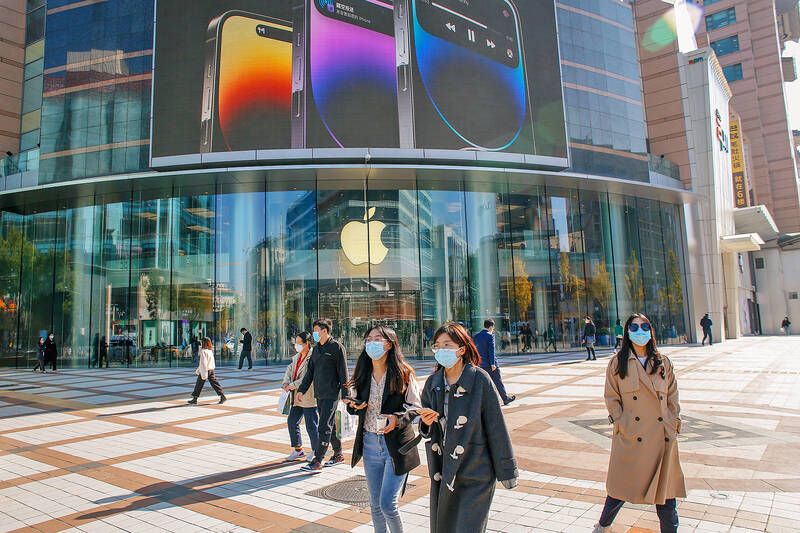More than a dozen of Apple Inc’s Chinese suppliers are receiving initial clearance from India to expand in the country, helping the tech giant’s efforts to diversify its assembly network beyond China.
AirPod and iPhone assembler Luxshare Precision Industry Co (立訊精密) and a unit of lensmaker Sunny Optical Technology Group Co (舜宇光學) are among the companies gaining approval, people familiar with the matter said.
The clearances from key Indian ministries are a step toward full approval for expansion in India, and the companies are still likely to be required to find local Indian joint venture partners, the people said.

Photo: EPA-EFE
Apple and other US electronics brands are seeking to reduce their reliance on China after trade restrictions and production disruptions related to COVID-19 laid bare the risks of too much concentration in one country.
The clearances signal that India is allowing more Chinese companies to build out its tech manufacturing sector, even as political tensions between the Asian neighbors have intensified.
Indian Prime Minister Narendra Modi has made it a national priority to grow India’s manufacturing sector, providing financial incentives and government support for expansion projects.
Apple has played a central role in that effort, with partners such as Hon Hai Precision Industry Co (鴻海精密) producing more iPhones in the country for the latest generation than ever before.
About 14 suppliers are receiving a green light from India after Apple named them as companies whose services it needs to increase its presence in the country, they said.
While the vast majority of Apple products are still assembled in China, the company has in recent years begun making more products in India through Taiwanese partners.
Apple wields tight control over its supply chain, which comprises hundreds of component makers. Some Indian companies, such as the Tata Group, already provide Apple with parts, and the country is pushing to add more local providers into the supply chain to boost and diversify its electronics industry. Joint ventures with Chinese component makers are a way of achieving the goal.
India largely cut off Chinese companies from its tech economy after the countries’ troops clashed violently on their long-disputed border in 2020, leading to at least 20 deaths on the Indian side. The incident sent anti-China business sentiment soaring in the country.
India has since banned apps of Alibaba Group Holding Ltd (阿里巴巴), Tencent Holdings Ltd (騰訊) and ByteDance Ltd (字節跳動), and raided, probed and penalized a raft of other Chinese tech companies from phone makers to fintech service providers.
The country has also tightened rules that forbid companies from bordering countries from establishing a presence without government consent, and Chinese companies have missed out on state incentives to tech manufacturers.
Meanwhile, India has been steadily ramping up local assembly of smartphones, allowing Taiwanese manufacturers Hon Hai, Wistron Corp (緯創) and Pegatron Corp (和碩) to set up plants.
However, the absence of crucial component makers has limited the domestic industry’s growth.
While India is now approving several Chinese suppliers’ expansion in the country, some are still being rejected, the people said.
Apple submitted a list of about 17 suppliers to Indian authorities, and a few of them were turned down, at least one because of direct ties to the Chinese government, one of the people said.
Han’s Laser Technology Industry Group Co (大族雷射科技) and Shenzhen YUTO Packaging Technology Co (深圳裕同包裝科技) are among those being cleared, they said.

Vincent Wei led fellow Singaporean farmers around an empty Malaysian plot, laying out plans for a greenhouse and rows of leafy vegetables. What he pitched was not just space for crops, but a lifeline for growers struggling to make ends meet in a city-state with high prices and little vacant land. The future agriculture hub is part of a joint special economic zone launched last year by the two neighbors, expected to cost US$123 million and produce 10,000 tonnes of fresh produce annually. It is attracting Singaporean farmers with promises of cheaper land, labor and energy just over the border.

US actor Matthew McConaughey has filed recordings of his image and voice with US patent authorities to protect them from unauthorized usage by artificial intelligence (AI) platforms, a representative said earlier this week. Several video clips and audio recordings were registered by the commercial arm of the Just Keep Livin’ Foundation, a non-profit created by the Oscar-winning actor and his wife, Camila, according to the US Patent and Trademark Office database. Many artists are increasingly concerned about the uncontrolled use of their image via generative AI since the rollout of ChatGPT and other AI-powered tools. Several US states have adopted

A proposed billionaires’ tax in California has ignited a political uproar in Silicon Valley, with tech titans threatening to leave the state while California Governor Gavin Newsom of the Democratic Party maneuvers to defeat a levy that he fears would lead to an exodus of wealth. A technology mecca, California has more billionaires than any other US state — a few hundred, by some estimates. About half its personal income tax revenue, a financial backbone in the nearly US$350 billion budget, comes from the top 1 percent of earners. A large healthcare union is attempting to place a proposal before

KEEPING UP: The acquisition of a cleanroom in Taiwan would enable Micron to increase production in a market where demand continues to outpace supply, a Micron official said Micron Technology Inc has signed a letter of intent to buy a fabrication site in Taiwan from Powerchip Semiconductor Manufacturing Corp (力積電) for US$1.8 billion to expand its production of memory chips. Micron would take control of the P5 site in Miaoli County’s Tongluo Township (銅鑼) and plans to ramp up DRAM production in phases after the transaction closes in the second quarter, the company said in a statement on Saturday. The acquisition includes an existing 12 inch fab cleanroom of 27,871m2 and would further position Micron to address growing global demand for memory solutions, the company said. Micron expects the transaction to